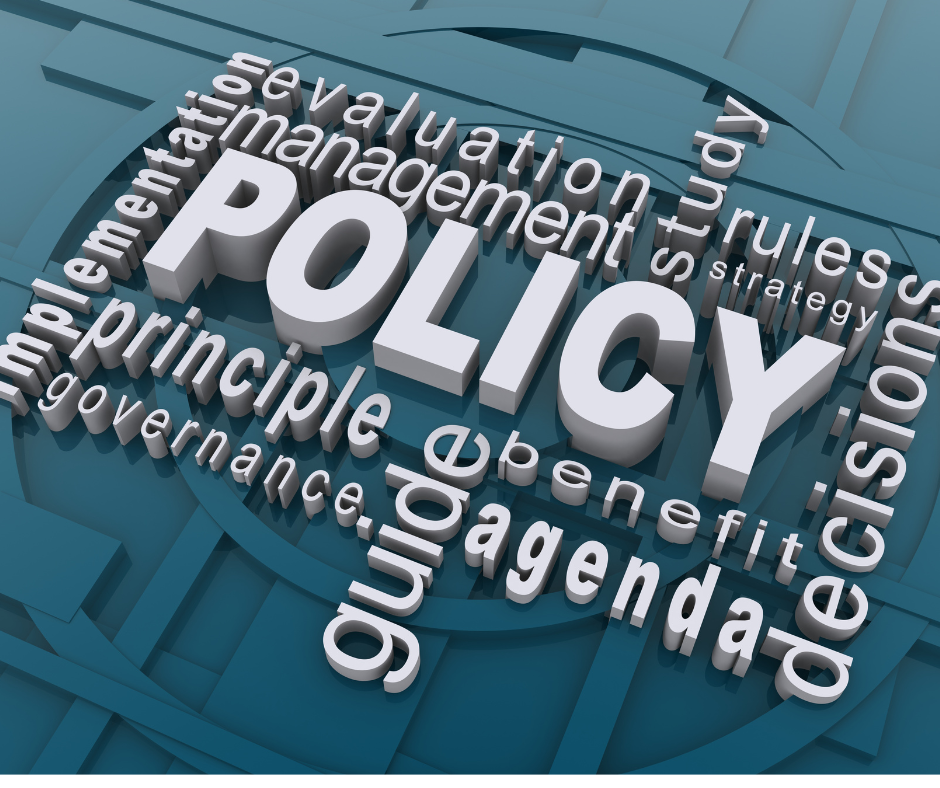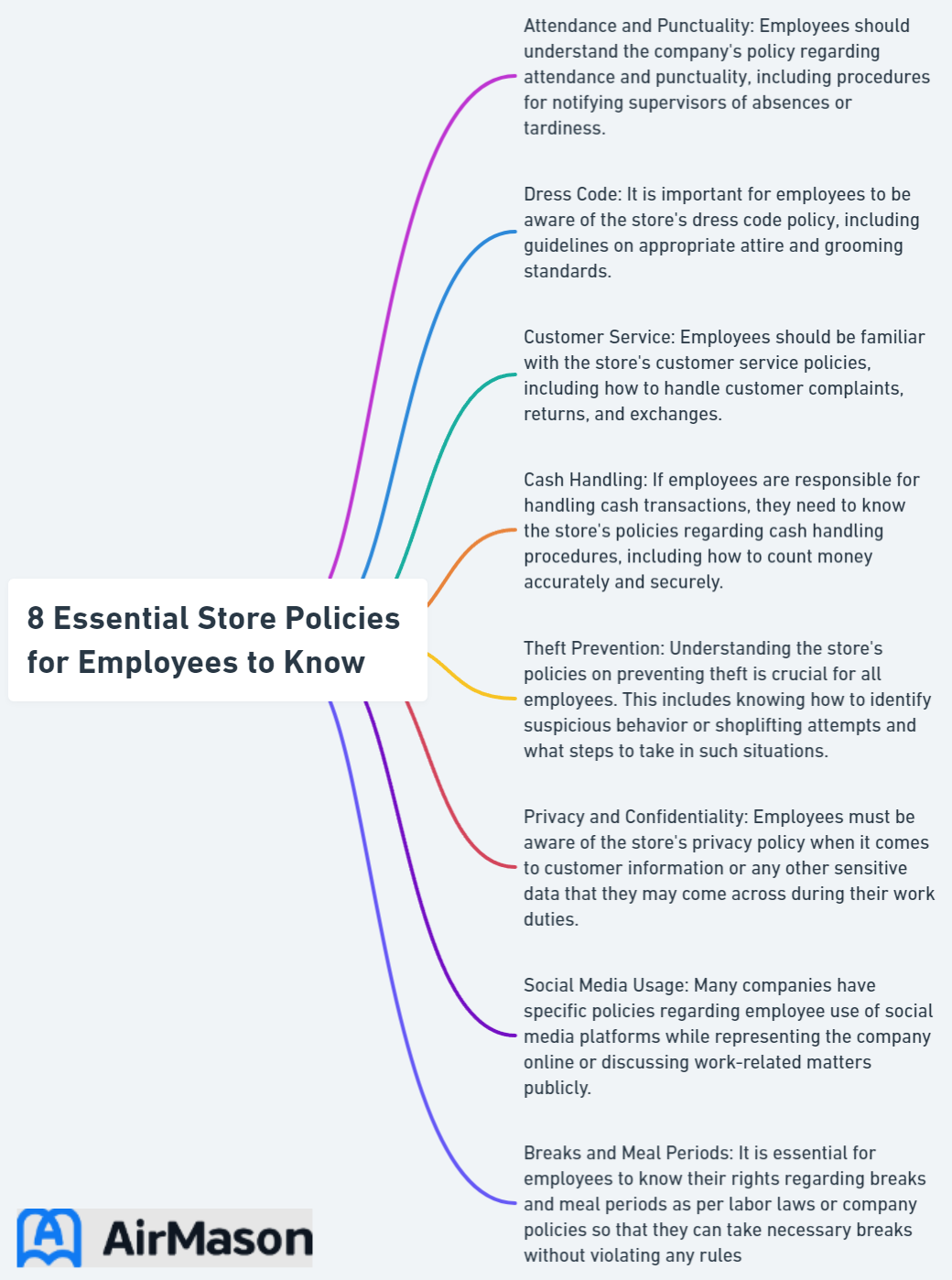
In today’s competitive business landscape, having effective store policies for employees is more critical than ever. These policies not only ensure smooth operations but also foster a positive work environment, leading to increased employee satisfaction, productivity, and ultimately, business success. So, are you ready to explore the essential store policies that every employee should know? Let’s dive in!
Key Takeaways
- Create a positive work environment by fostering company culture, setting expectations for employee conduct and providing training.
- Establish policies on dress code, personal appearance, communication & use of equipment to maintain professionalism and protect resources.
- Provide benefits & development opportunities to support employees’ well-being & growth while promoting business success.
Key Policy for Employees
In our organization, the “Key Policy for Employees” serves as the foundational framework outlining the essential guidelines and principles that shape the employee experience. This comprehensive policy encapsulates the key expectations and responsibilities employees are expected to adhere to throughout their tenure. Emphasizing transparency and mutual understanding, the “Key Policy for Employees” aims to foster a harmonious work environment. It covers critical aspects such as professional conduct, performance expectations, and compliance with organizational values, including adherence to legal policies such as privacy policies, terms and conditions, return policies, and shipping policies. These legal policies are crucial for maintaining legal obligations, transparency, and liability protection. By aligning employees with these key policies, we strive to create a workplace culture that promotes collaboration, growth, and a shared commitment to our organizational objectives.
Creating a Positive Work Environment
A positive work environment is the foundation of employee satisfaction and productivity. It has been proven that a healthy work atmosphere significantly impacts employee morale and overall business performance. The key elements of a robust company culture and employee behavior, as outlined in the employee manual, include:
- Standards for attire
- Timeliness
- Presence
- Personal cleanliness
- Utilization of personal devices
Building a positive work environment necessitates clear communication of your company culture and setting definitive expectations for employee conduct. This can be done through the employee handbook, ongoing training, and open communication within the organization. By setting the right tone at the top, you’ll create an environment where employees feel valued, motivated, and engaged, ultimately driving the success of your retail business.

Company Culture
As the backbone of a healthy work environment, company culture warrants clear communication to employees, achievable through the employee handbook and continuous training. To prevent discrimination and create an inclusive atmosphere, managers should be informed of relevant regulations enforced by the Equal Employment Opportunity Commission and receive appropriate supervisory and leadership training.
This not only ensures compliance with non-discrimination policies but also helps avoid potential liability and negative publicity, which could lead to reduced customer traffic. Ensuring legal compliance with these regulations is crucial in creating an inclusive work environment, highlighting the importance of adhering to laws and guidelines that support non-discrimination and equality.
Employee Conduct
For maintaining a professional and respectful work environment, the definition of expectations for employee conduct is a necessity. Your employee code of conduct should outline expected behaviors, ethics, and standards, such as exhibiting professionalism, fostering teamwork, and upholding company values.
It’s also important to include guidelines for engaging with customers and providing service, such as demonstrating politeness, respect, and professionalism. By establishing clear expectations, employees can work together effectively, creating a positive atmosphere for both staff and customers.
Dress Code and Personal Appearance

The creation of a professional image and a comfortable atmosphere for both employees and customers heavily relies on dress code and personal appearance policies. A well-defined dress code policy not only ensures consistency but also supports the company’s brand and values.
In addition, personal appearance policies, such as grooming standards, help maintain a clean and tidy work environment, contributing to overall employee satisfaction and customer perception of the business.
Appropriate Attire
To maintain a professional environment and meet customer expectations, guidelines on appropriate attire must be clearly defined in the employee handbook. Factors such as the type of business, customer base, and job duties should be considered when establishing dress code guidelines. By providing clarity and upholding professionalism, your employees will not only feel confident in their appearance but also contribute to a positive impression on customers, ultimately boosting your business’s success.
Grooming Standards
Ensuring a clean and professional appearance from employees heavily depends on established grooming standards. By establishing clear guidelines and expectations for personal hygiene, you create a safe and pleasant work environment for everyone involved.
Employers should also consider the specific requirements of different job roles when setting grooming standards, ensuring that all employees can comfortably and confidently perform their duties while adhering to the company’s expectations.
Communication and Use of Company Equipment

Efficient operations and protection of company resources hinge on clear communication and proper usage of company equipment. Establishing communication policies and guidelines for using company equipment ensures that employees understand the proper utilization of resources and act in a professional manner. By setting clear expectations and providing ongoing training, you’ll not only minimize potential misunderstandings but also create an environment where employees can effectively collaborate and contribute to the success of your retail store.
Clear Communication
For efficient employee interactions with customers, vendors, and colleagues, and for the use of company devices and platforms, establishing clear communication policies is a must. Effective communication policies should cover aspects such as maintaining professionalism, demonstrating empathy, and providing accurate information.
Additionally, it’s crucial to include guidelines for using company devices, ensuring that employees understand the importance of maintaining confidentiality and following the company’s social media policy.
Company Equipment Usage
Policies regarding company equipment usage need to delineate expectations for responsible and secure use of company resources, inclusive of personal devices if applicable. These policies play a crucial role in safeguarding company assets and ensuring that employees utilize resources efficiently and professionally.
Providing clear guidelines for the appropriate use of company equipment, such as avoiding personal use during work hours and maintaining the confidentiality of sensitive information, not only promotes a productive work environment but also protects your business interests.
Customer Service Policies for Enhancing Customer Satisfaction

Any successful retail business fundamentally relies on customer service policies, including the role of the customer service team in ensuring customer satisfaction through effective return and refund policies. Maintaining high levels of customer satisfaction and loyalty depends on the quality of service provided by your employees. By establishing clear customer service policies, including refund policies and a return policy, and providing ongoing training, you’ll empower your employees to handle customer interactions professionally and efficiently. This includes managing complaints with transparency and clarity about return and refund policy, guiding customers through the return process smoothly. Offering alternatives like store credit can further exceed customer expectations, driving loyalty and repeat business, ultimately leading to positive word-of-mouth recommendations.
Handling Complaints
Effective handling of customer complaints forms a critical part of retaining customer satisfaction and loyalty. To effectively handle customer complaints, employees should:
- Stay calm
- Listen attentively
- Apologize
- Resolve the issue promptly
It’s also essential for employees to be aware of the company’s social media policy, ensuring that they respond professionally and appropriately to any customer complaints or concerns that may arise online.
Exceeding Expectations
Building loyalty and driving positive word-of-mouth referrals hinge on exceeding customer expectations. By going above and beyond to provide exceptional service, your employees can create memorable experiences that will leave customers feeling valued and appreciated.
As a retail store owner, encourage your employees to take the initiative to locate products, suggest personalized options, or provide additional assistance whenever possible. These small gestures can make a significant impact on customer satisfaction and ultimately contribute to the long-term success of your retail business, setting you apart from other retail stores.
Safety and Security Procedures

Protection of employees, customers, and company assets is heavily dependent on safety and security procedures. Implementing effective safety measures, such as emergency protocols and loss prevention strategies, not only creates a safe and secure environment for all but also minimizes potential risks and liabilities.
By regularly reviewing and updating your safety and security policies, you can ensure that your retail store remains a secure and welcoming space for both employees and customers.
Emergency Protocols
Preparation of employees to handle various emergency situations requires the establishment and regular review of emergency protocols. These protocols should include clear communication, comprehensive training, and awareness of resources to ensure that employees are well-equipped to respond effectively and efficiently.
By fostering a culture of preparedness and safety, you’ll not only protect your employees and customers but also minimize potential disruptions to your business operations.
Loss Prevention Strategies
The minimization of theft and other security risks in a retail store is heavily reliant on loss prevention strategies. Implementing measures such as employee training, security systems, and regular assessments of policies and procedures can help deter potential threats and safeguard your company assets.
By proactively addressing potential vulnerabilities and continually adapting your loss prevention strategies, you’ll ensure the ongoing security and success of your business.
Employee Benefits and Leave Policies
Support for work-life balance and overall employee well-being is significantly impacted by employee benefits and leave policies. By offering a comprehensive range of benefits and clearly outlining leave policies in the employee handbook, you’ll not only attract and retain top talent but also foster a positive and supportive work environment.
These policies can improve employee morale, reduce turnover, and ultimately contribute to the long-term success of your retail business, especially in times when American retailers suffer billions in losses.
Vacation and Paid Time Off
To ensure consistent treatment of employees and maintain a positive work environment, clear vacation and paid time off policies are indispensable. By providing fair and transparent guidelines regarding vacation time, you’ll help employees plan their time off effectively while minimizing potential disruptions to your business operations.
This not only supports employee well-being but also contributes to a more productive and engaged workforce.
Sick Leave and Medical Accommodations
Support for employees when they are unwell or require medical attention is deeply dependent on sick leave and medical accommodation policies. By establishing clear guidelines for documentation and communication, you’ll ensure that employees receive the necessary support and flexibility when dealing with health-related issues.
These company policies, including a progressive discipline policy, not only promote a healthy work environment but also demonstrate your company’s commitment to employee well-being and satisfaction.
Training and Development Opportunities

Promotion of employee growth and satisfaction significantly relies on the provision of training and development opportunities. By offering ongoing skill development programs and fostering a culture of learning and growth, you’ll empower your employees to reach their full potential and contribute to the success of your retail business.
Investing in employee development not only improves productivity and performance but also enhances employee engagement and retention.
Onboarding and Orientation
The acclimation of new employees to your company and their role largely depends on effective onboarding and orientation processes. By providing comprehensive information, resources, and support during the onboarding process, you’ll ensure that new hires feel welcomed and engaged from the start. This not only fosters a positive work environment but also sets the foundation for long-term employee satisfaction and loyalty.
Continuous Skill Development
Driving employee growth and satisfaction necessitates the encouragement of continuous skill development. By providing ongoing training opportunities, you’ll help your employees:
- Stay up-to-date with industry trends, technologies, and best practices
- Enhance their skills and capabilities
- Foster a culture of learning and growth within your organization.
Ultimately, investing in employee development leads to improved productivity, performance, and overall business success.
Summary
In conclusion, implementing effective store policies for employees is crucial for fostering a positive work environment, driving employee satisfaction and productivity, and ultimately, ensuring the success of your retail business. By focusing on key areas such as company culture, dress code, communication, customer service, safety and security, employee benefits, and training and development, you’ll create a thriving and supportive atmosphere where employees can excel and contribute to your company’s growth. So, why wait? Start implementing these essential store policies today and watch your retail business flourish!
Policy for Working Remotely
Our “Policy for Working Remotely” outlines the guidelines and expectations for employees engaging in remote work. This policy is designed to ensure a seamless transition to a remote work environment while maintaining productivity and upholding the company’s standards. Employees are required to adhere to the specified guidelines, including communication protocols, task management, and security measures, as outlined in the “Policy for Working Remotely.” Regular check-ins and updates are essential to ensure alignment with team objectives and to address any challenges promptly. This policy aims to foster a flexible yet disciplined remote work culture that contributes to the overall success of our organization.
Frequently Asked Questions
What are examples of store policies, including return and refund policy?
Store policies typically cover returns, refunds, shipping, payment processing methods, applicable taxes, packaging, size charts (for clothing or shoes) and applicable warranties.
What does store policy mean?
Store policy refers to an agreement between a store and its customers, outlining the rules of use and customer service measures such as returns and refunds. It serves to create a smooth and hassle-free shopping experience.
How do you store policies and procedures?
Store policies and procedures should be stored in a format that is easy to update, such as electronic files or binders. This ensures that your staff has access to the documents for efficient changes.
What policies should go into an employee handbook?
An employee handbook should include policies covering Employment Basics, Workplace Policies, Code of Conduct, Compensation and development, Benefits and Perks, Working Hours, PTO and Vacation, Employee Resignation and Termination, Equal Employment Opportunity (anti-discrimination), Anti-harassment, Anti-retaliation, At-will nature of employment, General Employment Information, Safety and Security, Americans with Disabilities Act, Personal Safety, Sexual Harassment, Drug and Alcohol, Violence and Weapons, Attendance, Hours of Work and Meal and Rest Periods.
What is the importance of a positive work environment in retail stores?
Creating a positive work environment in a retail store is essential for employee satisfaction, boosting productivity and morale, and ultimately ensuring the success of the business.